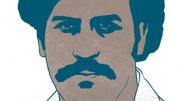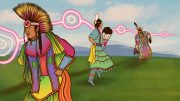Jebediah Springifield is more than just a man. Arguably, he’s not even a man at all. As the founder of Springfield, Jebediah is the paragon of greatness in Springfield. From the innocent infants, to the cynical children, to the lethargic barflies populating Moe’s, Jebediah Springfield seems to be the only thing that the entire town can get excited about.
In “The Telltale Head,” the bullies’ wish that someone would decapitate the iconic statue in town square is only “cloud talk.” This excitement is further evidenced by the episode “Lisa the Iconoclast,” when Jebediah is foregrounded at the town’s bicentennial celebration. School children actually appear enthused when asked to write a report on Springfield. In the audio commentary on the season-seven DVDs, executive producer Bill Oakley says, “There are so many things on The Simpsons where people don’t take anything seriously [ . . . ]. They don’t have any hopes or dreams or loyalty to anything. And one of the things that apparently binds Springfield together is that everyone loves Jebediah Springfield.” It seems that everyone is willing to accept him as a treasured hero, and he gives Springfield its identity as a hard-working town in middle America.
Jebediah Springfield, in any medium, is nobly portrayed. The statue at the centre of town shows him triumphing over a bear. The grainy old video the kids watch in school shows a brash Troy McClure taming a wild buffalo. The town motto comes from a memorable Springfield quote: “A noble spirit embiggens the smallest man.” This phrase, of course, became a song which extends Springfield’s nobility to the ideals of American culture. It goes, “That a people might embiggen America, that a man might embiggen his soul.”
But this image of Springfield is threatened when Lisa finds out that Jebediah Springfield was in fact the murderous pirate Hans Sprungfeld who attempted to kill George Washington. Lisa feels compelled to expose this version of Jebediah to the town in the interest of historical accuracy but the town refuses to accept it.
The historical Jebediah Springfield is not the one that people love — the real person has no bearing on the town. The town’s identity was not bound up with the physical human being, but the ideas of hard work and noble spirits that they hold dear. In this regard, Jebediah is to Springfield what King Arthur is to Britain. Arthur represents the unity of Britain’s identity as a literary figure in Malory’s Le Morte Darthur and Geoffrey of Monmouth’s History of the Kings of Brtiain, not as a historical king, whom little is known about. Through his valiance and ability to solidify British government, Arthur represents the ideal Briton, just as Jebediah’s valiance and leadership solidifies Springfield’s identity, causing Marge’s ancestors to choose it over Stenchburg.
This is what Lisa realizes when she has the chance to prove Jebediah’s fraudulence to the whole town. After trying it out on a few select people, she finds that no one is willing to accept a less than perfect hero. As Moe says, Lisa’s outcry is going to make the Town Jubilation Committee “a lot less jubilant.” She finds that historical accuracy is less important than what he represents.
She tells Hollis Hurlbut, antiquarian of Springfield, that “the myth of Jebediah has value too. It’s brought out the best of everyone in this town.” The loss of that icon would likely “debiggen” the town’s sense of pride and identity. At the sacrifice of truth, the cultural value of Jebediah remains strong. He embiggens the town — who embiggens you?



